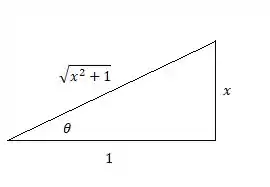Calcule a integral indefinida:
Passo 1
Para resolver essa integral vamos fazer uma substituição trigonométrica, temos que a expressão é da forma , nesse formato de expressão vamos fazer e utilizar a identidade trigonométrica :
Substituindo temos:
Agora usando a identidade trigonométrica:
Vamos deixar tudo em termos de e :
Passo 2
Para calcular essas integrais vamos usar substituição, na primeira vamos ter:
Aplicando vamos ter:
Agora é fácil achar as primitivas da função, usando uma expressão da Tabela de Integrais Indefinidas:
Aplicando:
Passo 3
Na segunda vamos transformar em integrais de cossecantes:
Com a primeira integral vamos usar a fórmula de Recorrência:
E a integral de achamos usando uma expressão da Tabela de Integrais Indefinidas:
Agora é só aplicar:
E aplicar também na segunda integral lá de cima e vamos juntar tudo:
Passo 4
Calma, não terminou ainda, vamos ter que voltar para a variável original :
Temos que , assim vamos usar o triângulo retângulo abaixo:

Assim os valores de , e são:
Pronto, ficamos então com: